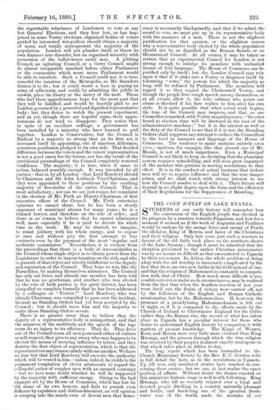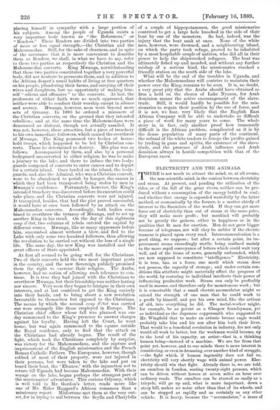THE COUP D'VTAT ON LAKE NYANZA.
STUDENTS of our early history will remember how the conversion of the English people was checked in its progress by a reaction towards Paganism, and bow for a moment it seemed as if the work of Augustin and Paulinus would be undone by the savage force and energy of Penda, the idolator, King of Mercia, and hater of the Christians and their religion. Only last year, just such a reaction in favour of the old faith took place on the northern shores of the Lake Nyanza ; though it must be admitted that the situation presented to the earlier Christian missionaries was by no means so difficult as that encountered in Uganda by their successors. In Africa, the whole problem of doing away with the old worship is immensely complicated by the fact that there are two new faiths in the field instead of one, and that the religion of Mahommed is constantly in competi- tion with that of Christ. How much more difficult is suc- cessful conversion under such circumstances, may be realised from the fact that when the heathen reaction of last year wore itself out, the fruits of victory were carried off, not by the followers of the English and Roman Catholic missionaries, but by the Mahommedans. If, however, the presence of a proselytising Mahommedanism is left out of sight, or if it is compared to the efforts made by the Church of Ireland to Christianise England for the Celtic rather than the Roman rite, the record of what has taken place in Uganda has a peculiar interest for those who desire to understand English history by comparing it with matters of present knowledge. The Kings of Wessex, Kent, and Mercia were very little more civilised than King Mwanga, and the process through which the true religion was received by their peoples is almost exactly analogous to that which takes place in Africa to-day.
The long report which has been forwarded to the Church Missionary Society by the Rev. E. C. Gordon tells in full detail the facts as to the revolutions in Uganda. Up till now, only mutilated stories have reached us con- cerning these events ; but we can at last realise the exact position of affairs. Without doubt the drama enacted on this miniature historic stage is well worth following. King Mwanga, who till so recently reigned over a loyal and devoted people dwelling in a country naturally pleasant and fertile, and bordering one of the greatest fresh- water seas of the world, made the mistake of not placing himself in sympathy with a large portion of his subjects. Among the people of Uganda exists a very important body known as " the Reformers," or " Readers." These Readers are divided into two parties of more or less equal strength,—the Christian and the Mahommedan. Still, for the sake of clearness, and in spite of the assurance that it is more convenient to describe them as Readers, we shall, in what we have to say, refer to these two parties as respectively the Christian and the Mahommedan converts. King Mwanga, notwithstanding that these two parties constituted together a very powerful body, did not hesitate to persecute them, and in addition to the African despot's usual habits of living at free quarters on his people, plundering their farms, and carrying off their wives and daughters, lost no opportunity of making him- self " odious and offensive " to the converts. At last, the professors of either faith were so much oppressed, that neither were able to conduct their worship except in silence and secrecy. Mwanga, however, soon went beyond mere acts of tyranny. In 1886 he ordered a massacre of the Christian converts, on the ground that they intended rebellion ; and at the same time the Mahommedans were denounced as disloyal, though not actually assailed. It was not, however, these atrocities, but a piece of treachery to his own immediate followers, which caused the overthrow of Mwanga. The King possessed two bodies of house- hold troops, which happened to be led by Christian con- verts. These he determined to destroy. His plan was as follows. Accompanied by them, and also by a personal bodyguard unconverted to either religion, he was to make a journey to the lake, and there to induce the two body- guards composed of converts to enter canoes and to depart for a certain island. Once landed on the island, the body- guards, and also the Admiral, who was a Christian convert, were to be abandoned to perish by hunger, the canoes in which they had been transported being stolen by men in Mwanga's confidence. Fortunately, however, the King's intended treachery was discovered before its execution could take place, and the Christian converts were not injured. It transpired, besides, that had the plot proved successful, it would have at once been followed by an attack on the Mahommedan converts. Accordingly, both bodies com- bined to overthrow the tyranny of Mwanga, and to set up another King in his stead. On the day of this righteous coup d'etat, two columns of rebels entered the capital by different routes. Mwanga, like so many oppressors before him, succumbed almost without a blow, and fled to the Lake with only some two hundred followers, thus allowing the revolution to be. carried out without the loss of a single life. The same day, the new King was installed and the great officers of State appointed.
At first all seemed to be going well for the Christians. Two of their converts held the two most important posts in the country, and the new Sovereign publicly promised them the right to exercise their religion. The Arabs, however, had no notion of allowing such tolerance to con- tinue. It is true they had joined with the Christians to overthrow Mwanga, but their friendship was neither lasting nor sincere. Very soon they began to intrigue in their own interests, and at last contrived to get the King entirely into their hands, and to bring about a new revolution favourable to themselves but opposed to the Christians. The means by which the second coup d'etat was carried out were strangely like those employed in Europe. The Christian chief officer whose fall was planned was one day summoned to the King's presence to answer charges against his loyalty. Having left the Court, he went home, but was again summoned to the square outside She Royal residence, only to find that the attack on the Christians had already begun. The result of the fight, which took the Christians completely by surprise, was victory for the Mahommedans, and the capture and imprisonment of the English missionaries and the French Roman Catholic Fathers. The Europeans, however, though robbed of most of their property, were not injured in their persons, but were taken to the lake and put on board their boat, the Eleanor,' with the injunction not to return till Uganda had become Mahommedan. With their voyage on the lake, began perhaps the strangest part of the missionaries' adventures. This curious Odyssey, which is well told in Mr. Gordon's letter, reads more like one of Mr. Rider Haggard's African romances than a missionary report. Misfortune met them at the very out- set, for in trying to sail between the Scylla and Charybdis of a couple of hippopotamuses, the good missionaries contrived to get a large hole knocked in the side of their boat by one of the monsters. So bad, indeed, was the injury that the boat sank at once. None of the white men, however, were drowned, and a neighbouring island, on which the party took refuge, proved to be inhabited by a most hospitable couple of natives, who did all in their power to help the shipwrecked refugees. The boat was ultimately fished up and mended, and without any further mishap of a serious kind, the missionaries reached a friendly station on the south side of the lake.
What will be the end of the troubles in Uganda, and whether the Mahommedans will contrive to maintain their power over the King, remains to be seen. It is, no doubt, a very great pity that the Arabs should have obtained so firm a hold on the shores of Lake Nyanza, for Arab dominion means the active encouragement of the slave- trade. Still, it would hardly be possible for the mis- sionaries to regain their position by the use of force, and it is not, we fear, very likely that the English East African Company will be able to undertake so difficult a piece of work for many years to come. The whole story is, in fact, only another proof how immensely difficult is the African problem, complicated as it is by the dense population of many parts of the continent, the refusal of the white traders to forego the profits gained by trading in guns and spirits, the existence of the slave- trade, and the presence of Arab influence and Arab dominion always in hostile competition with that of the European races.







































 Previous page
Previous page